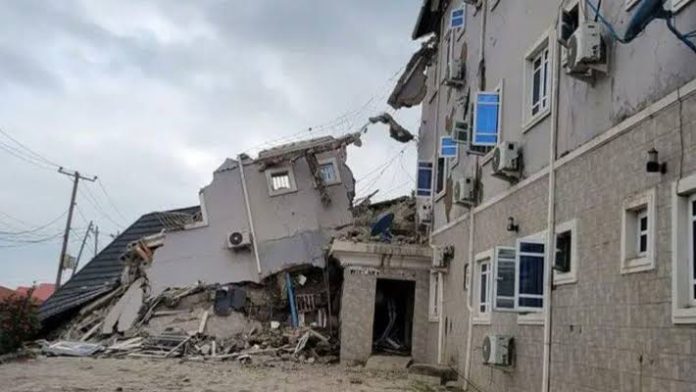News Investigators/ The Federal Government has urged stakeholders in the building and construction sector to find lasting solutions to incessant building collapses across the country.
The Minister of State for Industry, Trade and Investment, Sen. John Enoh gave the charge on Tuesday in Abuja at the National Conference on the Building/Construction sector.
The theme of the event is: “Adherence to Standard Practices: Bedrock of Sustainable Development in the Building/Construction Sector organised by Standards Organisation of Nigeria ( SON).
The News Agency of Nigeria (NAN) reports that the country has recorded several incidences of building collapses in recent times.
The Building Collapse Prevention Guild said Lagos State recorded the highest cases with more 351 buildings caving in the last 50 years.
The report showed that the 351 collapsed buildings in Lagos represented 55.28 per cent of the total of 635 recorded cases across the country during this period.
The Minister of State said: “I am aware of the several efforts by some on this matter. My mandate to you on this crucial matter, is to ensure safer, more reliable structures.
“This forum affords me a chance to relate with relevant stakeholders in the industry, to unite and collaborate for the common purpose of safety.
“I encourage everyone to focus more on the areas of pre-construction, construction and post-construction regulatory and enforcement framework in the promotion of public awareness, and capacity building enhancement”.
Enoh reiterated the commitment of President Bola Tinubu’s led administration to the security of lives and property of citizens.
“Putting a stop to the unending incidents of building and construction collapses is paramount and I believe adhering to strictly agreed standard practices will be a contribution to the priority of the administration.
“I look forward to very robust engagements and discussions, and hope that the outcome of this will be very enabling and very useful to getting this sector, the building and construction sector right”, he said.
Earlier, the SON Director –General, Dr Ifeanyi Okeke decried the non awareness of Industry stakeholders to the standards required for safe, durable and sustainable buildings in spite numerous sensitisation.
” This knowledge gap exists not only among construction workers but also among suppliers and building professionals.
“Training and education are essential to bring everyone up to par with international best practices, but that may not be all there is.
“In the same way, our growing population requires a rapid increase in affordable housing, which brings with it the challenge of meeting demand without compromising on quality.
” Innovative materials, construction techniques and designs must be developed and standardised to meet this demand while maintaining quality and safety, “he said
He expressed the commitment of SON to promoting safe practices, ensure quality and sustainable development via its initiatives.
“SON has worked closely and will continue to do so with industry experts and practitioners to develop and update standards for construction materials, techniques and safety protocols, ” Okeke said..
Meanwhile, the President, Council for the Regulation of Engineering in Nigeria (COREN), Prof. Sadiq Abubakar, emphasised the importance of standards in building construction.
“The building industry is peculiar in the sense that there are codes and standards that govern activities from design to completion of projects.
“The efforts of the SON in the development/ domestication of codes and standards in collaboration with stakeholders must not go unnoticed but we need to do more.
“Nigeria is situated in sub-Saharan Africa with its inherent weather conditions different from that of the temperate and other regions hence the need for local codes and standards that addresses these peculiarities,” he said.
He urged the utilisation of initiatives such as the Nigerian Industrial Standards (NIS) that covered building materials such as Cement, Glass, Steel, and Blocks among .
The COREN president said there was nothing wrong with the adaptation of foreign codes and standards, such as the British Standards and Eurocodes.
He, however, said that adaptation of such needed to address the local conditions and peculiarities in the country.
According to Abubakar, the adherence to standard practice, therefore, requires a robust monitoring framework, effective regulation and diligent enforcement where necessary.
NAN

